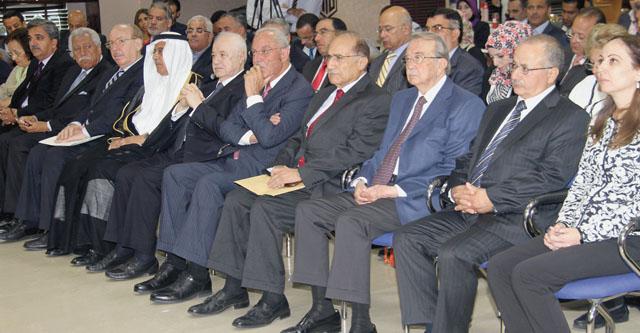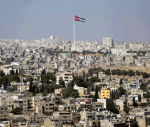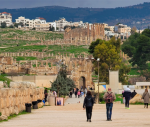You are here
Inter-Arab trade ‘weak’ as challenges remain unaddressed
By Dana Al Emam - Oct 07,2015 - Last updated at Oct 07,2015
AMMAN — Further trade facilitations are crucial for uplifting the efficiency of inter-Arab trade, experts said Wednesday.
Speaking at the Fifth Conference of the World Trade Organisation’s (WTO) Chairs Programme, Taleb Awad Warrad, WTO chair holder, said each 1 per cent drop in inter-trade costs increases the sector’s revenues by $40 billion.
Warrad, who is also a professor of international economics at the University of Jordan’s (UJ) business school, said the volume of inter-Arab trade, which forms nearly 8 per cent of the region’s overall commerce, is among the lowest internationally.
He noted that trade exchange between European countries reaches nearly 70 per cent, while in Asian and African countries it reaches up to 40 per cent and 30 per cent respectively.
“Economic integration among Arab countries can be enhanced when non-customary challenges are addressed effectively to minimise trade cost,” he said at the conference held at UJ.
For his side, WTO Chief Statistician Hubert Escaith said border procedures, transportation infrastructure and non-tariff measures are the biggest challenges facing regional trade.
He cited three levels of action to enhance efficiency of regional trade: within the national, regional and international contexts, underscoring the significance of harmonising trade regulations among neighbourings countries aiming for economic integration.
Escaith also highlighted the role of regional banks in providing funding for projects addressing development of infrastructure.
Although the production of complex products can be “internationally fragmented”, as production of several parts of a single product can be manufactured in several countries, technological advancement can bridge geographical gaps.
Sub-regional trade, such as that among the Gulf Cooperation Council, is even weaker than large-scale, inter- Arab trade, according to Nahil Saqfelhait, an associate professor of economics at UJ.
She cited complex tax and protectionist measures on trade-related services as two main reasons for “weak” inter-Arab trade exchange, with political unrest on the top of the list.
The total inter-Arab trade volume in 2013 was as low as 2 per cent of the region’s overall trade transactions, excluding oil, she said, citing the World Bank’s Logistics Performance Index.
The core challenge for Arab countries lays in implementing regional trade agreements, said Zoubi Zoubi, dean of UJ’s business school, calling for further efforts in utilising the professional and craftsmanship potential among refugees in industrial and agricultural fields.
The WTO Chairs Programme, launched in 2010, aims to enhance knowledge and understanding of the trading system among academics and policy makers in developing countries through curriculum development, research and outreach activities by universities and research institutions, according to the organisation’s website.
Related Articles
Advancement in technology and means of transportation should be exploited to achieve Arab economic integration and enhance the efficiency of inter-Arab trade, experts told a conference on Sunday.
AMMAN — Secretary General of the Ministry of Investment Zaher Qatarneh on Thursday stressed the need to support pan-Arab economic integratio
AMMAN — Deputising for His Majesty King Abdullah, Deputy Prime Minister and Minister of State for Economic Affairs Jafar Hassan on Tuesday i















